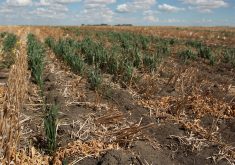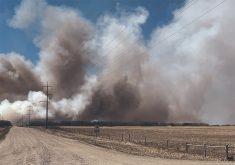Our heavy reliance on glyphosate is going to change. Exactly how this is going to play out is anyone’s guess, but with the tidal wave of lawsuits alleging cancer from Roundup herbicide the status quo is not sustainable.
When the first lawsuits were launched in the United States, many observers expected them to be defeated. When they were successful, observers expected them to be overturned upon appeal. Instead, the decisions have been maintained with huge settlements.
In the first widely reported case, the award to a California groundskeeper was reduced from $289 million to $78 million, but this was followed by a case awarding another California man $80 million. Most recently, again in California, a couple was awarded $2 billion. That’s billion with a “B”. The first time I heard the report, I thought the announcer had misspoken.
Read Also

Proactive approach best bet with looming catastrophes
The Pan-Canadian Action Plan on African swine fever has been developed to avoid the worst case scenario — a total loss ofmarket access.
Related story: U.S. judge appoints mediator for Roundup discussions
With thousands of lawsuits pending in the U.S., the drama is now coming to Canada with a class action lawsuit led by a Moose Jaw farmer filed against Bayer and Monsanto.
You can’t blame the people with cancer. Most of them probably believe what they’re alleging. On the other hand, it’s hard to have much respect for lawyers who should know better.
What a strange world we have when a jury of laypersons gets to make the major scientific determination that glyphosate caused someone’s cancer. Joe the electrician and Judy the homemaker get to contradict the experts.
As Health Canada pointed out in its recently conducted comprehensive review, “No pesticide regulatory authority in the world currently considers glyphosate to be a cancer risk to humans at the levels at which humans are currently exposed.”
That doesn’t matter in a court of law where glib-tongued lawyers will point to the International Agency for Research on Cancer which in 2015 classified glyphosate as “probably carcinogenic to humans.”
It appears the court cases will continue for years and the settlements will add up to a massive sum. Many farmers don’t have much sympathy for the big input suppliers, but the lawsuits are going to have ramifications down to the farm level.
Whether name brand Roundup from Bayer / Monsanto or generic glyphosate from other manufacturers, it can’t be business as usual when anyone with cancer can successfully sue just because they have some history of exposure to your product.
Glyphosate sales may be limited to those with application safety training. In addition, the safety requirements are likely to be far more extensive than the current recommendations.
This change won’t necessarily come from regulatory bodies such as the Pest Management Regulatory Agency. It will come from the companies as they try to protect themselves from future lawsuits.
Guess which direction the price of glyphosate will go. The legal avalanche is going to be extremely expensive and damaging for Bayer. The future risk for Bayer and all the generic manufacturers will have to be offset by a higher price, perhaps a much higher price.
With advent of glyphosate-resistant weeds, particularly kochia, glyphosate isn’t the stand-alone wonder product it once was. However, it’s still integral to pre-seeding weed control and Roundup Ready canola and many rely on it as a pre-harvest treatment.
It’s one of our safest products, but it’s the most vilified. Our heavy reliance on glyphosate is in a state of transition due to both public opinion and the billions that will be paid in opportunistic lawsuits.
Kevin Hursh is an agricultural journalist, consultant and farmer. He can be reached by e-mail at kevin@hursh.ca.


















